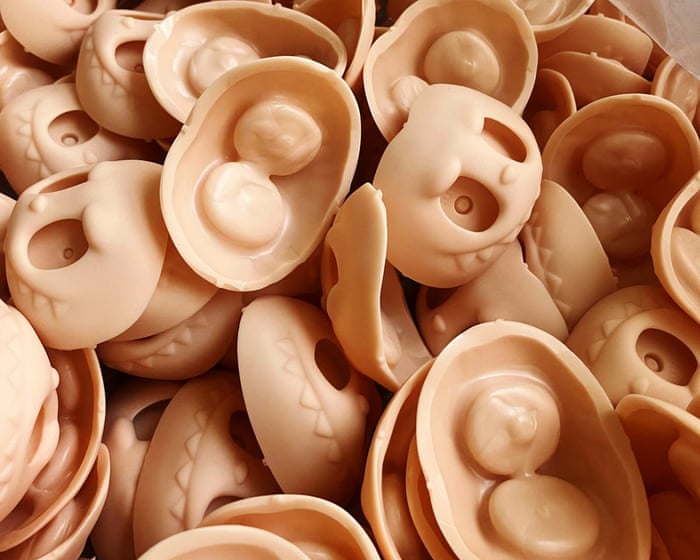Trolleys stacked with severed silicone monster heads, tattooed dealers lurking in alleyways, and bin bags of knockoff goods hidden behind shop counters—welcome to the world of Lafufus.
Fake Labubus, or Lafufus, are flooding the underground market. As demand for the collectible furry keychains skyrockets, entrepreneurs in Shenzhen’s bustling trade hub are rushing to produce cheap imitations for eager Labubu collectors. But Chinese authorities, eager to protect this rare soft-power success, are cracking down on the counterfeit trade.
“Labubus have become very sensitive,” says an unofficial vendor in a small, unmarked shop selling fake designer goods, tucked away on the 17th floor of a nondescript office building in Shenzhen’s Huaqiangbei district—an area famous for cheap electronics. “We don’t dare talk about it,” her colleague adds.
Labubus, the furry, bunny-eared elf dolls made by Chinese toy company Pop Mart, have exploded in popularity this year. Endorsed by celebrities from Rihanna to Blackpink’s Lisa, the “ugly-cute” figures have been in such high demand that Pop Mart temporarily pulled them from UK stores over fears of customer fights. In the UK, they sell for £17.50, while official versions in China range from 99 to 399 yuan (£10.30–£41.40), with resale prices soaring even higher.
Chinese authorities have embraced the hype, celebrating Pop Mart as the latest homegrown brand to gain global appeal, following hits like the video game Black Myth: Wukong and AI firm DeepSeek. In June, the Communist Party’s People’s Daily praised Labubus as a symbol of China’s shift from “Made in China” to “Created in China,” crediting their success to blending strong manufacturing with creative innovation that resonates with global consumers.
Pop Mart’s rise as a national icon has also spurred authorities to crack down on counterfeits, as China works to shed its reputation as a hub for knockoffs. In April, customs in Ningbo seized 200,000 goods suspected of infringing Labubu’s intellectual property, with another raid last month netting over 2,000 fakes.
About 40km from Huaqiangbei, 59-year-old Li Yang has never heard of a “Labubu.” Yet she spends hours each day in her high-rise apartment, carefully slicing apart hundreds of silicone monster heads that will later become Lafufus. Surrounded by piles of flesh-colored parts, Li and her neighbor Wang Bi, another stay-at-home grandmother, spill into their apartment hallway while working.
“Since we’re at home taking care of kids and doing housework, we wanted to find some side work,” Li explains. She doesn’t know where the heads come from or where they end up. The owner of a nearby factory, accused by Chinese media of producing Lafufus, denies any involvement—despite a suspicious pile of Labubu-like heads stacked in the hallway.
From business trend to national pride, Labubu’s success has made intellectual property protection a top priority for China like never before.”Labubu isn’t just a global best-selling toy—it’s become a tool of soft power for China,” explained Yaling Jiang, an analyst of Chinese consumer trends. “Protecting Labubu’s intellectual property isn’t just about business anymore—it’s a matter of national interest.”
As a result, the Lafufu market has gone underground. Authorities in Shenzhen’s Huaqiangbei district recently announced inspections targeting vendors selling “counterfeit and low-quality” Labubus. But finding a seller isn’t difficult.
After a quick phone call from a street vendor peddling fake designer bags and watches, a slender, tattooed man appeared out of nowhere, his canvas tote overflowing with cuddly keychains. He led The Guardian into a busy mall, stopping at a counter selling hairdryers and sunglasses. With a few discreet glances, the well-dressed shop assistant pulled out a black plastic bag from behind the counter—filled with Lafufus, priced at 168 yuan (£17.40) each.
The fakes likely come from various sources, but Li’s* operation works like this: Every few days, a courier arrives at her apartment building with a trolley loaded with bags of hundreds of molded monster heads. The heads are machine-made, but splitting them open—so they can be stuffed and reassembled into finished toys—is painstaking work. It requires carefully cutting along the curved edge of each head by hand with a sharp knife.
So Li and her neighbors, all elderly women, are hired to slice the heads open, earning 0.04 yuan per piece from the mystery factory. Each time the courier arrives, Li hauls down bags of split heads and collects a fresh batch of elf-like figures ready for cutting. One woman estimated she could slice through 800 to 1,000 heads a day, making up to 40 yuan.
None of the workers The Guardian spoke to had any idea what a Labubu was. Wang* was stunned to learn that the finished toys—real or fake—sold for hundreds of yuan. But one person in this home factory recognized them immediately. As Li’s young granddaughter wandered into the hallway and saw her grandmother examining a finished toy, she squealed: “Labubu!”
*Names have been changed
Additional research by Lillian Yang



